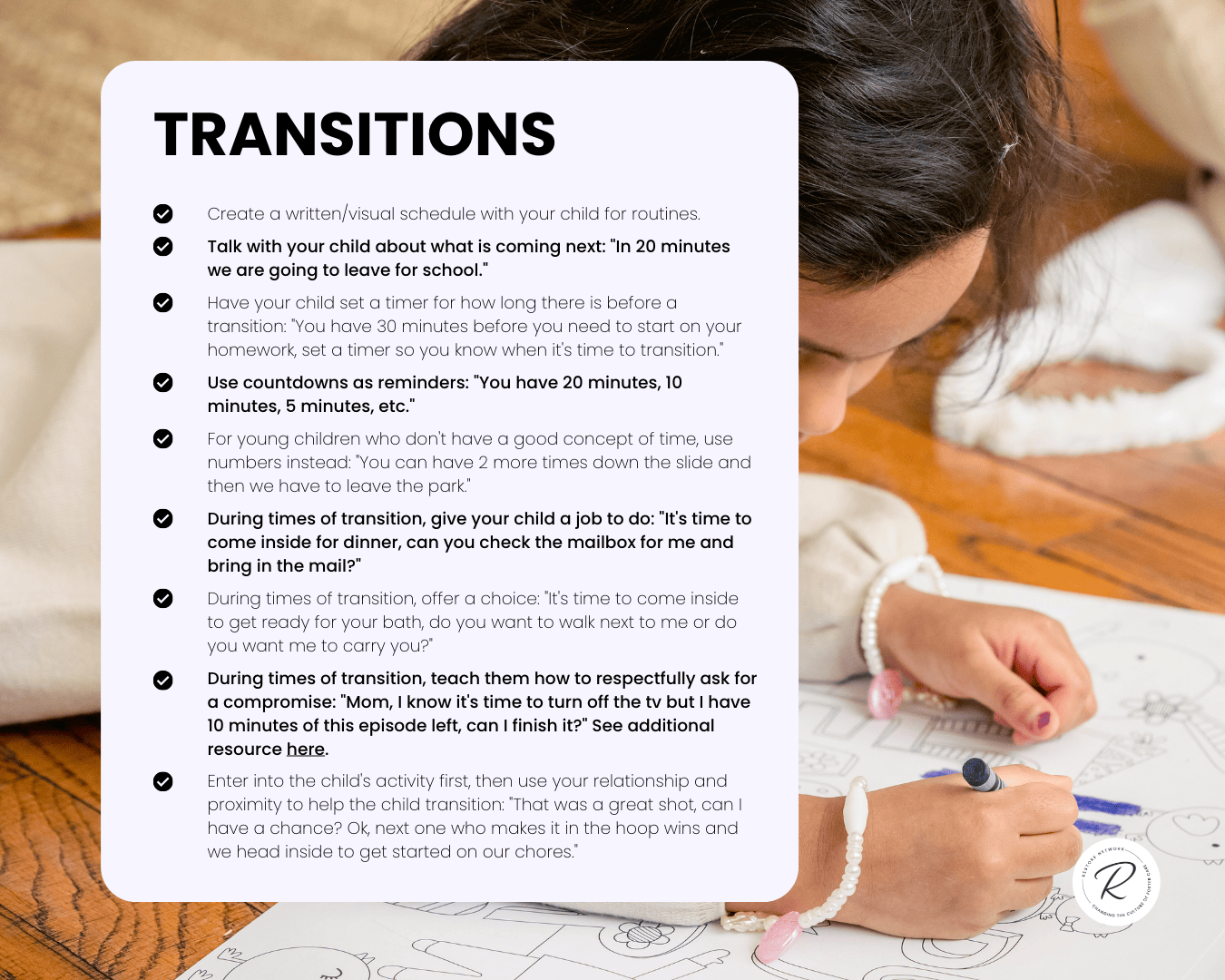by Ashley Bennett, Director of Trauma-Informed Care
Another part of helping support your child with structure, is helping them handle times of transition. This is a consistent challenge we see for our kids–they don’t do well with transitions. If you stop and think about their life, it makes sense. They have had lots of unwelcome transitions in their lives and many of our kids lack the regulation strategies needed to make a transition successfully. Plus also, it’s not fun to stop something you are enjoying, to do something that you won’t enjoy as much-we should all be able to relate to that!
Ok let’s talk more about transitions. We all experience numerous moments of transition throughout our day. When I get in my car to drive home from work, I am transitioning between work and home. When I start the bedtime routine with my children, we are transitioning. When we wake up, we are transitioning. Transitions are when we move from one thing to the next or start and stop something. Think about how many times a day, you ask your child to stop something they are doing to begin something else?
We can refer to all of these daily moments of transition as little T’s. And little T transitions can he HARD for kids. But now let’s talk about our children that we welcome into our home through foster care. When we think about kids in foster care, we must acknowledge that they have experienced unique Big T transitions-most of which have involved loss or been scary experiences for them.
This includes the transition into foster care and meeting their new caregivers, possibly transitions when they had to move from foster home to foster home, the transition to and from their weekly biological parent visits, and even permanency outcomes such as reunification or adoption.
Okay so we can see that our kids have faced some pretty significant Big T’s which have probably affected them, right?
Now let’s think of the little T transitions that our children in foster care experience that might be more complicated for them than the average child: mealtimes (due to food insecurities), bedtime routine (due to fear of night time or past sexual abuse history), daycare or school drop offs (due to fear of abandonment, fear of being picked up and taken somewhere else).
Now on top of those experiences, let’s throw in a body and brain that has missed out on some healthy adult mentoring. A body that likely was flooded with cortisol, the stress hormone, and didn’t have as much experience being flooded with calm. Add to that the high likelihood that your child’s executive functioning skills are less accessible than their peers due to in utero drug use and toxic stress and you have the recipe for a child who is going to struggle with moments of transition.
This is a really common thing for our children, so if one of your children struggles too, that makes sense!
He needs a little (sometimes a lot of) extra support from you to build up these skills within him. And the good news is that there are a lot of tools you can use to help walk with your child during these moments.
These transition tips are part of the empowering principles because they are proactive-things you can do during moments of transition to ease things and prevent those meltdowns, whininess, and control battles. They also build up your child’s brain, help them learn new skills, and help you stay connected to your child during these challenging moments. Win-win-win!
Need more support on this topic? Ask your County Director for our recorded webinar on the topic of transitions in one of our online training modules or see the below list of coregulating tips that can help you during moments of transitions with your child!


*Support for transitions are one of the Empowering Principles of Trust Based Relational Intervention (TBRI®). TBRI® is an attachment-based, trauma-informed intervention that is designed to meet the complex needs of vulnerable children. TBRI® uses Empowering Principles to address physical needs, Connecting Principles for attachment needs, and Correcting Principles to disarm fear-based behaviors. Learn more about TBRI® here: https://child.tcu.edu/

